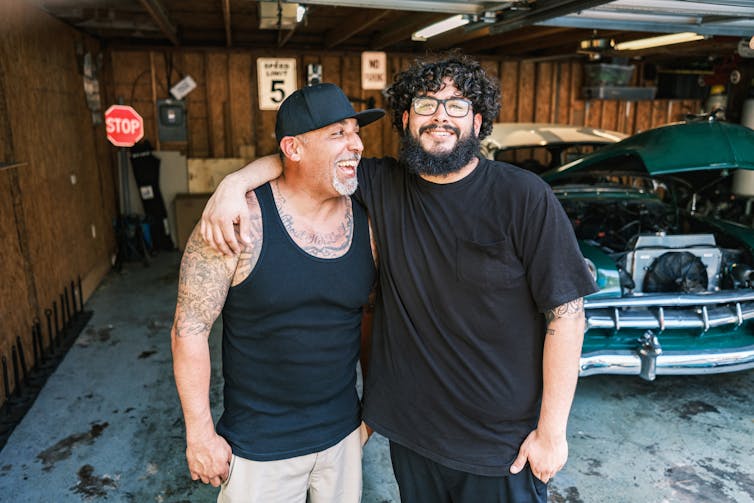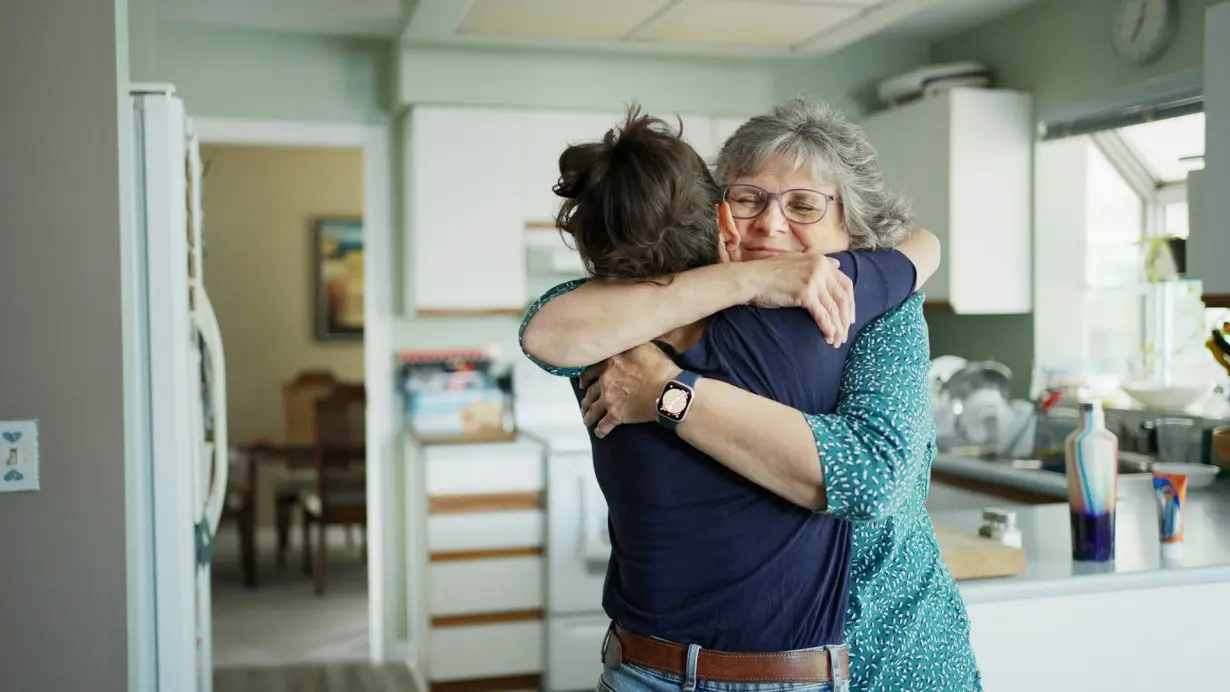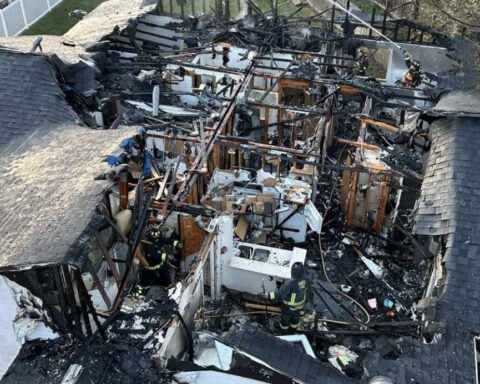As a professor of child development and family science, every year I witness college students heading home for the holidays after a few months of relative independence. Anecdotally, most students express excitement about returning home and say they’re looking forward to relaxing with family and friends.
However, it also can present a challenge for parents and their grown children. Parents may wonder: “What should I expect of my child when they return home after living away?” Adult children may be thinking: “I’m an adult, but I’m in my parents’ home. Do I need to ask permission to go out? Do I have a curfew?”
The adult child’s return home, even for a few days or weeks, may produce some stress for both generations. But, the parent-child relationship is always evolving, including negotiating – and renegotiating – power and control as children age.
In fact, families have been preparing for these new role changes for years. Think about when children enter middle school. They spend less time under their parents’ direct supervision. Parents must begin to find ways to stay connected with their children while encouraging independence. The challenge is the same with young adults, only their interests and the appropriate level of independence has changed.
Generally speaking, the parent-child relationship is relatively stable over time. And the good news is that most people navigate this transition successfully. Understanding a bit more about what developmental and family scientists know about this time of life might help ease the path forward.
Between adolescence and true adulthood
Many countries and societies consider you an adult once you turn 18. However, neuroscience research reveals that parts of the brain that are crucial for adult skills such as planning ahead, decision-making and controlling impulses do not finish developing until the mid- or late 20s. So, from a psychological perspective, the onset of adulthood is not universal and not determined by a specific age.
In 2000, psychologists introduced the concept of a period of development that spans ages 18 to 25: emerging adulthood. It’s a kind of in-between period, when people say they don’t feel fully adult.
It’s important to note that this developmental period is not something that everyone experiences. It’s most common in Western or industrialized countries, though there is research on the experiences of emerging adults in other cultures. This period of exploration and experimentation, however, is a luxury not available to all, with adolescents from lower socioeconomic backgrounds reaching milestones of adulthood such as financial independence or parenthood earlier than those from more affluent backgrounds.
But this life stage has become increasingly common in the 21st century, partly due to societal changes that give young adults more opportunities to explore identity and focus on themselves. For instance, the availability of birth control made sex without marriage more feasible for young adults. Many people take time before full-time work to pursue higher education. Today’s young adults can experiment with ideas and opportunities that weren’t available to them during adolescence.

Emerging adulthood can bring conflict as family members renegotiate roles and expectations.
You can probably imagine why emerging adult children and their parents might butt heads when under the same roof. The two generations’ differing opinions and ideals can set up conflict, especially when the child feels like an adult but the parent still sees them as a child. If parents can keep in mind that these young adult offspring are still navigating a distinct developmental phase, it may help them be supportive during this stage.
Relating adult to adult
When children leave the nest, the parent-child relationship goes through a period of adjustment. This is typical and, importantly, a necessary part of becoming an adult.
There’s likely to be a bit of trial and error for both the parent and the child as they figure out how to establish new ways of connecting and relating. But this isn’t the first time in a child’s life that a developmental transition has triggered the need for renegotiating the parent-child relationship. During adolescence, parents begin to provide their children with more freedom to make independent decisions; this requires parent and child to make adjustments in how they interact and relate to one another.
Psychology researchers point to several qualities of healthy parent-adult child relationships. Parents need to get comfortable with a low level of control over what their grown kids do. Parents can expect to know less about their adult child’s whereabouts when out for an evening and whom their adult child spends time with, something that parents monitor during adolescence. Maintaining a warm dynamic and encouraging independence are also key. Together, these attributes help parents promote success in their adult children, helping them grow into mentally healthy and well-adjusted members of society.
These tweaks in approach may initially be uncomfortable for parents. But with a little effort, they can successfully make this transition. It helps if they’ve maintained a good relationship with their kid all along. Psychologists typically define effective parenting during emerging adulthood as a relationship characterized by providing warm emotional support; supporting the child in making their own decisions; and refraining from using guilt to change a child’s beliefs.
Practical tips for evolving relationships
1. Be flexible and don’t compare. Every family is different, and each will navigate adult children returning home in unique ways. Likewise, there may be a need to adjust – and readjust – expectations and rules. Be comfortable with tweaking things to best suit your family.
2. Prepare by connecting. Discuss expectations from both generations before or shortly after the adult child returns home. Being proactive with communication will provide opportunities to connect and find common ground.
3. Establish boundaries and guardrails. Parents should communicate house rules for their adult children, and adult children should state their preferred boundaries. These guardrails should be developmentally appropriate and based on mutual respect.
4. Adjust expectations as needed. Parents should keep in mind that their child is in transition to adulthood. They should expect behavior that reflects having one foot in adolescence and the other in adulthood.

A healthy parent-adult child relationship can be rewarding and fun.
Warm, supportive parenting continues to be a good influence on development through the emerging adulthood years. Therefore, it is not surprising that emerging adults continue to seek guidance from their parents. Most parents and adult children find their new, more egalitarian relationship lets them connect in new, more mature ways.

Amy Root receives funding from National Institute of Child, Health, and Human Development.
Source: The Conversation

 Trump has begun another trade war. Here's a timeline of how we got here
Trump has begun another trade war. Here's a timeline of how we got here
 Canada's leader laments lost friendship with US in town that sheltered stranded Americans after 9/11
Canada's leader laments lost friendship with US in town that sheltered stranded Americans after 9/11
 Chinese EV giant BYD's fourth-quarter profit leaps 73%
Chinese EV giant BYD's fourth-quarter profit leaps 73%
 You're an American in another land? Prepare to talk about the why and how of Trump 2.0
You're an American in another land? Prepare to talk about the why and how of Trump 2.0
 Chalk talk: Star power, top teams and No. 5 seeds headline the women's March Madness Sweet 16
Chalk talk: Star power, top teams and No. 5 seeds headline the women's March Madness Sweet 16
 Purdue returns to Sweet 16 with 76-62 win over McNeese in March Madness
Purdue returns to Sweet 16 with 76-62 win over McNeese in March Madness








